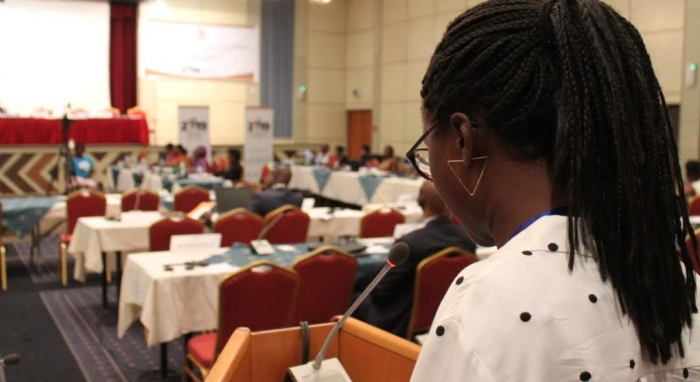On 22 October, ISHR delivered its statement on the situation of human rights in Africa, with a particular focus on human rights defenders. In Africa, civil society organisations are still working in a very restrictive environment, with fear dictating their every move, though they never lose track of their mission to work for a world that’s more just, equal and free for all.
In this statement, ISHR’s Africa advocacy consultant Adélaïde Etong Kame noted that, though there is a trend in a number of countries towards the adoption of national laws protecting human rights defenders, many countries are still adopting laws that restrict the enjoyment of freedom of assembly of their citizens. ‘Indeed, this is the case in Benin where the government adopted in 2018 a new Criminal Code stipulating in its article 240 that any direct provocation to an unarmed gathering, that is to say to a peaceful demonstration, is punished by a one-year imprisonment if it has been followed by action,’ said Etong Kame.
In light of the recent events in Guinea, ISHR called on States to respect the exercise of freedom of peaceful assembly by their citizens, as provided in article 11 of the African Charter, and encouraged them to refer to the guidelines on freedom of association and assembly adopted by the Commission when drawing up or reviewing laws and policies to ensure compliance with regional and international protection standards.
In the past few years, we have observed an upsurge in the number of human rights abuses committed during election periods. These abuses range from violent repression of protests to Internet shutdowns preventing defenders from sharing information and organising their movement. In some cases, attacks against defenders went as far as killing them for voicing their concerns about the candidates or about the lack of transparency in the election process. In Mozambique, Anastácio Matavel was a victim of a vicious killing which occurred on 7 October 2019 after he participated in a training on election observation, just a few days before the general elections. At this occasion, ISHR called on Mozambique to undertake a prompt and impartial investigation to ensure justice for Matavel and all civil society activists who have been targeted for exercising their right to dissent.
All these actions contribute to severely restricting civic space in Africa and installing an on-going climate of fear that defenders have to defy in order to make their voices heard.
Contact: Adélaïde Etong Kame, Africa Advocacy Consultant, [email protected]
Photo: David Meffe, DefendDefenders




